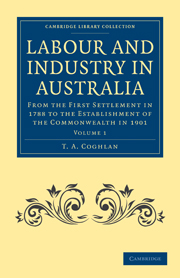 Labour and Industry in Australia
Labour and Industry in Australia Book contents
- Frontmatter
- PREFACE
- Contents
- PART I FROM THE FOUNDATION OF SETTLEMENT TO THE CROSSING OF THE MOUNTAINS
- I INTRODUCTION TO THE FIRST PERIOD
- II THE ASSIGNMENT SYSTEM
- III MUSTERS
- IV WAGES AND WORKING HOURS
- V THE CURRENCY
- VI LAND POLICY
- VII THE GENESIS OF THE WOOL INDUSTRY IN AUSTRALIA
- VIII THE INDUSTRIES OF THE PERIOD
- IX TRADE AND PRICES
- PART II FROM THE CROSSING OF THE MOUNTAINS TO THE ABOLITION OF THE ASSIGNMENT SYSTEM
- PART III FROM THE ABOLITION OF THE ASSIGNMENT SYSTEM TO THE DISCOVERY OF GOLD
- PART IV FROM THE DISCOVERY OF GOLD TO THE INTRODUCTION OF FREE SELECTION OF LAND BEFORE SURVEY
- Frontmatter
- PREFACE
- Contents
- PART I FROM THE FOUNDATION OF SETTLEMENT TO THE CROSSING OF THE MOUNTAINS
- I INTRODUCTION TO THE FIRST PERIOD
- II THE ASSIGNMENT SYSTEM
- III MUSTERS
- IV WAGES AND WORKING HOURS
- V THE CURRENCY
- VI LAND POLICY
- VII THE GENESIS OF THE WOOL INDUSTRY IN AUSTRALIA
- VIII THE INDUSTRIES OF THE PERIOD
- IX TRADE AND PRICES
- PART II FROM THE CROSSING OF THE MOUNTAINS TO THE ABOLITION OF THE ASSIGNMENT SYSTEM
- PART III FROM THE ABOLITION OF THE ASSIGNMENT SYSTEM TO THE DISCOVERY OF GOLD
- PART IV FROM THE DISCOVERY OF GOLD TO THE INTRODUCTION OF FREE SELECTION OF LAND BEFORE SURVEY
Summary
When the First Fleet set sail from England, it was not thought necessary that it should be supplied with any coin, as the authorities could not conceive what use money would be in a settlement, where there were to be no shops, where the public Stores would supply all that officers, settlers, and convicts required, and where accounts would be adjusted in the books of the Commissary, and balances liquidated by drafts on the Paymaster's Office in London. This doing without money might conceivably have been possible in a hermit colony, in which the members had no business transactions with one another, and with which there would be no communications from the outside world except through the few relief-ships, that were periodically to bring from England fresh batches of convicts and stores for the public use. Matters, however, did not work out quite in this way. There were many little transactions between the colonists that required money for their adjustment, and at a very early period of the colony's history private ships began to call at Port Jackson for purposes of trade or refitting. A small quantity of coin had been brought out by the officers and other free settlers, but this proved wholly inadequate to the requirements of the settlement, and almost immediately after his arrival Phillip wrote to England for a supply of money.
- Type
- Chapter
- Information
- Labour and Industry in AustraliaFrom the First Settlement in 1788 to the Establishment of the Commonwealth in 1901, pp. 67 - 84Publisher: Cambridge University PressPrint publication year: 2011First published in: 1918


